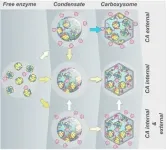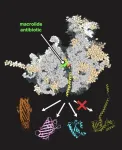Whale carcasses help answer mysteries of elusive species
2021-05-25
(Press-News.org) Summary: A new study published by the open access publisher Frontiers shows the usefulness of opportunistically collected specimens, such as stranded carcasses, to study elusive species. The researchers used stable isotope analysis of skin, muscle, and bone tissue of Sowerby's beaked whales to study their spatial ecology. They found that the species exhibits both short- and long-term habitat fidelity. The results are published in Frontiers in Conservation Science and show the importance of such studies for marine wildlife conservation.
A mysterious whale species
Beaked whales, a species of toothed whales, make up more than 25% of extant cetaceans (dolphins, porpoises, and whales), but are elusive and notoriously difficult to study. They live in deep waters and stay away from shores. Due to a lack of observations from the wild, little is known about their ecology and biology. Because of this, they are considered 'data deficient' by the IUCN Red List and developing conservation plans is challenging.
Some species of beaked whales have never been observed alive and are only known from stranded carcasses. "Beaked whales are really cool, but most people haven't heard of them because they are so enigmatic. Whales are generally large and charismatic - we can go on whale watching trips and see them in the wild, yet there are entire groups of whale species we know almost nothing about," says Dr Kerri Smith, of the University of Texas El Paso and the Smithsonian National Museum of Natural History, United States.
Sowerby's beaked whales (Mesoplodon bidens) were first described more than 200 years ago, yet little is known about this species. The species' geographic range is thought to cover much of the North Atlantic Ocean. Stranded animals have been collected from both North American and European waters, but it is unknown if the species is structured into spatially separate subpopulations or if there is one continuous and highly mobile population.
Stable isotope analysis to study elusive animals
Stable isotopes get incorporated into different tissue types through diet. The rate at which stable isotopes get incorporated into a tissue depends on the tissue's growth and replacement rates. For example, skin turnover rates are faster than those of muscle, which in turn are faster than the turnover of bone. Stable isotope analysis is an efficient tool that can be used when traditional techniques, such as GPS tracking and camera recording from field observations, can't be applied. It can be used to answer ecological and biological questions about a species' diet or spatial origin across time.
To better understand the species' spatial range, the researchers measured the carbon isotope (δ13C) and nitrogen isotope (δ15N) composition of skin, muscle, and bone tissue of Sowerby's beaked whales from the east and west Atlantic. The 102 samples were collected from museum specimens, stranded carcasses, and bycaught animals, and included females and males from all ages.
A treasure trove of data
When researchers work with specimens of opportunity, there is little control over how samples were collected. "In our study, the majority of our specimens came from strandings and fisheries bycatch; since these specimens represent only a small portion of all Sowerby's beaked whales, we only have a few pieces of a large, complex puzzle. Those pieces can tell us a lot, however, and the more we study these whales, the more we will learn about their distributions, behavior, and lives."
The results show that there are at least two subpopulations of Sowerby's beaked whales, one each in the eastern and western Atlantic. "Our study has two major results. First, it demonstrates the power of specimens of opportunity to answer fundamental ecological questions - these specimens are treasure troves of data waiting for someone to query them," says Smith. "Second, it provides some of the first data about Sowerby's beaked whale long-term distribution and population structure, something that would be nearly impossible to learn by studying living whales in their habitat. We can learn a lot about beaked whale ecology from specimens of opportunity." The researchers suggest genetic analysis to explore possible genetic differentiation between the two populations.
The findings have implications for marine wildlife conservation. The two populations found here likely have different conservation needs. Smith concludes: "A key action to take going forward is generating more fundamental data through studies like this one - successful conservation action requires a strong foundation of reliable data, and there is still so much we do not know about beaked whales and many other marine species. As we learn more about them and their habitats, we may need to set aside important habitats as marine protected areas. Additional research to identify the potential influence of fishing activities and naval sonar on critical beaked whale habitats is also needed."
INFORMATION:
ELSE PRESS RELEASES FROM THIS DATE:
2021-05-25
In a study funded by National Institute for Health Research (NIHR) Maudsley Biomedical Research Centre (BRC) researchers examined whether depression, either before or during pregnancy, affects the mother-infant relationship. The research was published today (Tuesday 25 May) in BJPsych Open.
Researchers looked at the quality of mother-infant interactions eight weeks and 12 months after birth in three groups of women; healthy women, women with clinically-significant depression in pregnancy, and women with a lifetime history of depression but healthy pregnancies.
The study used a sample of 131 women: 51 healthy mothers with no current or past depression, 52 mothers with depression referred to the South London and Maudsley ...
2021-05-25
A team of UBC Okanagan researchers is looking at strategies that could help the homeless during a pandemic.
John Graham, director of UBC Okanagan's School of Social Work, says while many populations have been targeted with guidelines to keep them safe, homeless people have been mostly overlooked.
While this research project began a few years ago, Graham says his team quickly turned their attention to the impact of COVID-19. His team looked at peer-reviewed publications, dating back to 1984, that examined how homeless populations were impacted by other highly contagious or communicable illnesses such as tuberculous, H1NI and Severe Acute Respiratory Syndrome ...
2021-05-25
Researchers from University of Sydney, University of Florida, and Rutgers University published a new paper in the Journal of Marketing that examines the role of serendipity in customer satisfaction and how marketers can provide it.
The study, forthcoming in the Journal of Marketing, is titled "Serendipity: Chance Encounters in the Marketplace Enhance Consumer Satisfaction" and is authored by Aekyoung Kim, Felipe Affonso, Juliano Laran, and Kristina Durante.
Netflix knows you are tired of choice. The streaming service recently introduced what might be the perfect hack: a shuffle button that eliminates choice and plays a randomly selected program for the consumer. Under COVID-19 restrictions, the newly homebound were happy to have so many programming ...
2021-05-25
BINGHAMTON, N.Y. - A team of evolutionary biologists including faculty at Binghamton University, State University of New York have shown that some Anolis lizards, or anoles, have adapted to rebreathe exhaled air underwater using a bubble clinging to their snouts.
Semi-aquatic anoles live along neotropical streams and frequently dive for refuge, remaining underwater for up to 16 minutes. Lindsey Swierk, assistant research professor of biological sciences at Binghamton University, documented this behavior in a Costa Rican anole species in 2019. She had been shocked to see an anole submerge itself for such long periods and used a GoPro underwater to document the behavior.
"It's easy to imagine the advantage that these small, slow anoles gain by hiding from their predators ...
2021-05-25
A new study from the Institute of Psychiatry, Psychology and Neuroscience (IoPPN) at King's College London has established that Intermittent Fasting (IF) is an effective means of improving long term memory retention and generating new adult hippocampal neurons in mice, in what the researchers hope has the potential to slow the advance of cognitive decline in older people.
The study, published today in Molecular Biology, found that a calorie restricted diet via every other day fasting was an effective means of promoting Klotho gene expression in mice. Klotho, which is often referred to as the "longevity gene" has now been shown in this study to play ...
2021-05-25
A study of healthcare workers shows they were three times more likely to become infected during the COVID-19 pandemic compared to the general population. Around one in five of workers who were infected were asymptomatic and unaware they had COVID-19.
The study published in ERJ Open Research [1] also shows that it was not only frontline staff who faced the higher risk, suggesting that there was transmission between staff and within the wider community.
However, health care workers who had been infected were very unlikely to contract COVID-19 a second time in the following six months.
The research was led by Professor James Chalmers, a consultant respiratory physician from the University of Dundee, UK. He said: "We have always believed that front line health workers face a high risk ...
2021-05-24
Rubisco is arguably the most abundant--and most important--protein on Earth. This enzyme drives photosynthesis, the process that plants use to convert sunlight into energy to fuel crop growth and yield. Rubisco's role is to capture and fix carbon dioxide (CO2) into sugar that fuels the plant's activities. However, as much as Rubisco benefits plant growth, it also can operate at a notoriously slow pace that creates a hindrance to photosynthetic efficiency.
About 20 percent of the time Rubisco fixes oxygen (O2) molecules instead of CO2, costing the plant energy that could have been utilized ...
2021-05-24
According to researchers at the University of Illinois Chicago, the antibiotics used to treat common bacterial infections, like pneumonia and sinusitis, may also be used to treat human diseases, like cancer. Theoretically, at least.
As outlined in a new Nature Communications study, the UIC College of Pharmacy team has shown in laboratory experiments that eukaryotic ribosomes can be modified to respond to antibiotics in the same way that prokaryotic ribosomes do.
Fungi, plants, and animals -- like humans -- are eukaryotes; they are made up of cells that have a clearly defined nucleus. Bacteria, on the other hand, are prokaryotes. They are made up of cells, which do not have a nucleus and have a different structure, size and properties. The ribosomes of eukaryotic and procaryotic cells, ...
2021-05-24
New York, NY--May 24, 2021--Whenever you buy something on Amazon, your customer data is automatically updated and stored on thousands of virtual machines in the cloud. For businesses like Amazon, ensuring the safety and security of the data of its millions of customers is essential. This is true for large and small organizations alike. But up to now, there has been no way to guarantee that a software system is secure from bugs, hackers, and vulnerabilities.
Columbia Engineering researchers may have solved this security issue. They have developed SeKVM, the ...
2021-05-24
MISSOULA, Mont., May 24, 2021 -- Scientists from the Rocky Mountain Research Station collaborated to explore how research and management can confront increasing uncertainty due to climate change, invasive species, and land use conversion.
Wildland management and policy have long depended on the idea that ecosystems are fundamentally static, and periodic events like droughts are just temporary detours from a larger, stable equilibrium. However, ecosystems are currently changing at unprecedented rates. For example, bark beetle infestations, droughts, and severe wildfires have killed large numbers of trees across the western ...
LAST 30 PRESS RELEASES:
[Press-News.org] Whale carcasses help answer mysteries of elusive species


